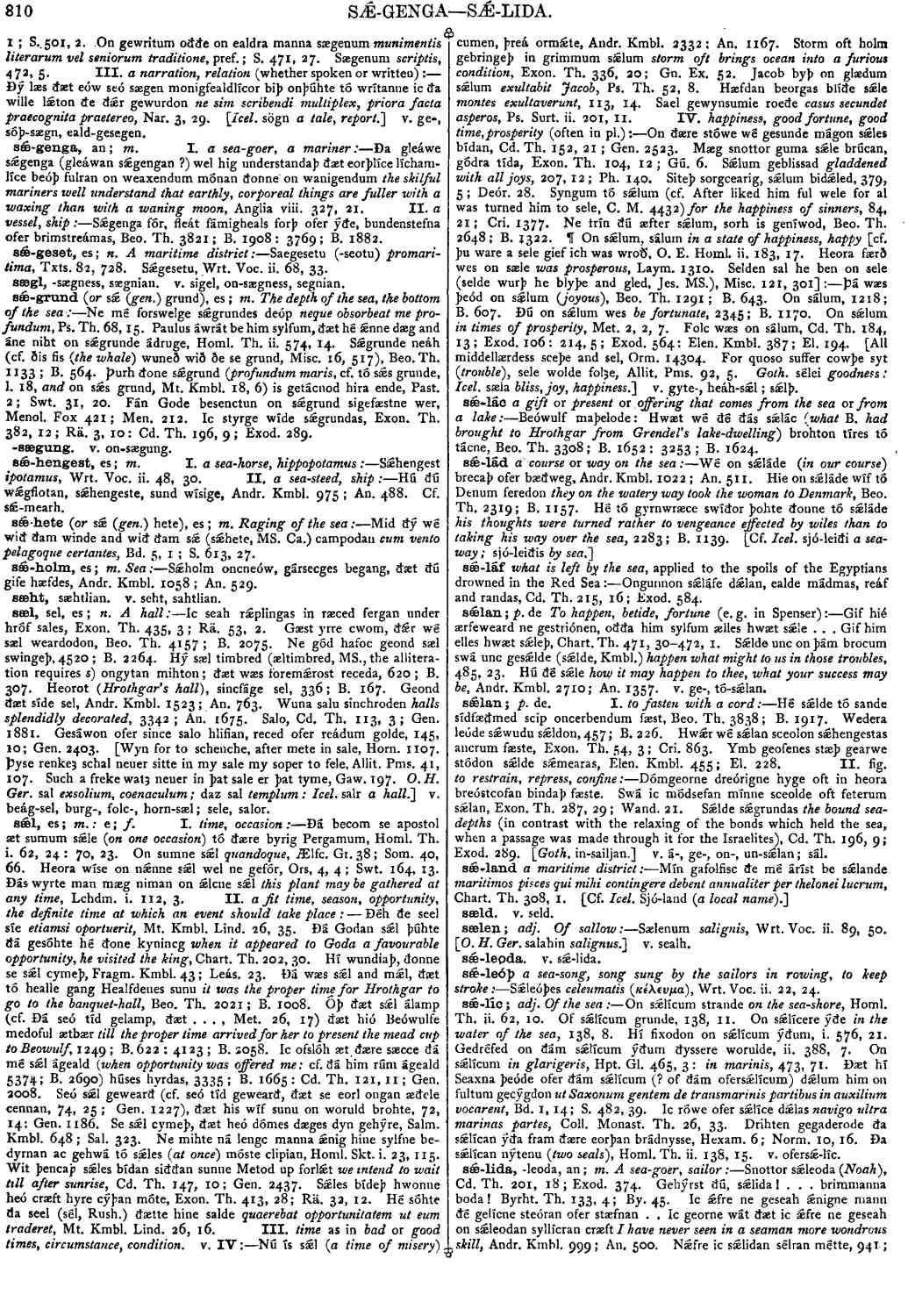sǽl
- noun [ masculinefeminine ]
-
Ðá becom se apostol æt sumum sǽle (
on one occasion
) tó ðære byrig- Pergamum, Homl. Th. i. 62, 24: 70, 23.
-
On sumne sǽl
quandoque,
- Ælfc. Gr. 38; Som. 40, 66.
-
Heora wíse on nǽnne sǽl wel ne gefór,
- Ors. 4, 4; Swt. 164, 13.
-
Ðás wyrte man mæg niman on ǽlcne sǽl
this plant may be gathered at any time,
- Lchdm. i. 112, 3.
-
Ðéh ðe seel síe
etiamsi oportuerit,
- Mt. Kmbl. Lind. 26, 35.
-
Ðá Godan sǽl þúhte ðá gesóhte hé ðone kynincg
when it appeared to Goda a favourable opportunity, he visited the king,
- Chart. Th. 202, 30.
-
Hí wundiaþ, ðonne se sǽl cymeþ,
- Fragm. Kmbl. 43; Leás. 23.
-
Ðá wæs sǽl and mǽl, ðæt tó healle gang Healfdenes sunu
it was the proper time for Hrothgar to go to the banquet-hall,
- Beo. Th. 2021; B. 1008.
-
Óþ ðæt sǽl álamp (cf. Ðá seó tíd gelamp, ðæt . . . , Met. 26, 17) ðæt hió Beówulfe medoful ætbær
till the proper time arrived for her to present the mead cup to Beowulf,
- 1249; B. 622: 4123; B. 2058.
-
Ic ofslóh æt ðære sæcce ðá mé sǽl ágeald (
when opportunity was offered me:
cf. ðá him rúm ágeald- 5374; B. 2690) húses hyrdas, 3335; B. 1665: Cd. Th. 121, 11; Gen. 2008.
-
Seó sǽl gewearð (cf. seó tíd gewearð, ðæt se eorl ongan æðele cennan,
- 74, 25; Gen. 1227),
-
Se sǽl cymeþ, ðæt heó dómes dæges dyn gehýre,
- Salm. Kmbl. 648; Sal. 323.
-
Ne mihte ná lengc manna ǽnig hine sylfne bedyrnan ac gehwá tó sǽles (
at once
) móste clipian,- Homl. Skt. i. 23, 115.
-
Wit þencaþ sǽles bídan siððan sunne Metod up forlǽt
we intend to wait till after sunrise,
- Cd. Th. 147, 10; Gen. 2437.
-
Sǽles bídeþ hwonne heó cræft hyre cýþan móte,
- Exon. Th. 413, 28; Rä. 32, 12.
-
Hé sóhte ða seel (sél, Rush.) ðætte hine salde
quaerebat opportunitatem ut eum traderet,
- Mt. Kmbl. Lind. 26, 16.
-
Nú ís sǽl (
a time of misery
) cumen, þreá ormǽte,- Andr. Kmbl. 2332: An. 1167.
-
Storm oft holm gebringeþ in grimmum sǽlum
storm oft brings ocean into a furious condition,
- Exon. Th. 336, 20; Gn. Ex. 52.
-
Jacob byþ on glædum sǽlum
exultabit Jacob,
- Ps. Th. 52, 8.
-
Hæfdan beorgas blíðe sǽle
montes exultaverunt,
- 113, 14.
-
Sael gewynsumie roeðe
casus secundet asperos,
- Ps. Surt. ii. 201, 11.
-
On ðære stówe wé gesunde mágon sǽles bídan,
- Cd. Th. 152, 21; Gen. 2523.
-
Mæg snottor guma sǽle brúcan, gódra tída,
- Exon. Th. 104, 12; Gú. 6.
-
Sǽlum geblissad
gladdened with all joys,
- 207, 12; Ph. 140.
-
Siteþ sorgcearig, sǽlum bidǽled,
- 379, 5; Deór. 28.
-
Syngum tó sǽlum (cf. After liked him ful wele for al was turned him to sele, C. M. 4432)
for the happiness of sinners,
- 84, 21; Cri. 1377.
-
Ne frín ðú æfter sǽlum, sorh is geníwod, Beo. Th. 2648; B. 1322. ¶ On sǽlum, sálum
in a state of happiness, happy
[cf. þu ware a sele gief ich was wroð,- O. E. Homl. ii. 183, 17.
-
Heora færð wes on sæle
was prosperous,
- Laym. 1310.
-
Selden sal he ben on iele (selde wurþ he blyþe and gled,
- Jes. MS.), Misc. 121, 301
joyous
),- Beo. Th. 1291; B. 643.
-
On sálum,
- 1218; B. 607.
-
Ðú on sǽlum wes
be fortunate,
- 2345; B. 1170.
-
On sǽlum
in times of prosperity,
- Met. 2, 2, 7.
-
Folc wæs on sálum,
- Cd. Th. 184, 13; Exod. 106: 214, 5; Exod. 564: Elen. Kmbl. 387; El. 194.
Bosworth, Joseph. “sǽl.” In An Anglo-Saxon Dictionary Online, edited by Thomas Northcote Toller, Christ Sean, and Ondřej Tichy. Prague: Faculty of Arts, Charles University, 2014. https://bosworthtoller.com/26212.
Checked: 0